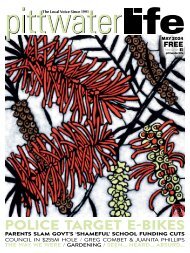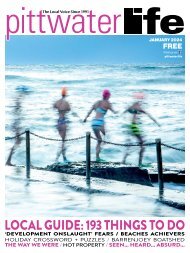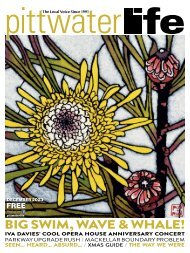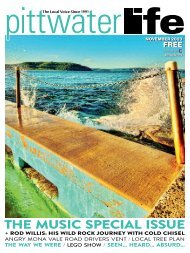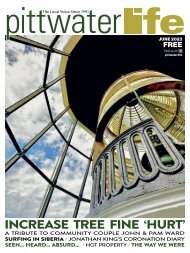Pittwater Life March 2017 Issue
The Soapbox Issue - Local Leaders Have Their Say. Great Scots. It's On For Young & Old.
The Soapbox Issue - Local Leaders Have Their Say. Great Scots. It's On For Young & Old.
You also want an ePaper? Increase the reach of your titles
YUMPU automatically turns print PDFs into web optimized ePapers that Google loves.
Seniors Health Special<br />
‘ACTIVE’<br />
INGREDIENTS<br />
Over the following pages, you’ll find general and specialist information on health issues<br />
affecting seniors, with simple messages to assist. Plus, tips from local experts will help<br />
you manage your health and wellbeing - so you can age well! Compiled by Lisa Offord<br />
Health & Wellbeing<br />
HEALTHY AGEING<br />
We have known for ages that healthy<br />
eating and being active is important<br />
to staying well and strong and it’s never<br />
too late to start paying attention to what<br />
you put into your mouth and how you use<br />
your body.<br />
Enjoying a wide variety of foods in the<br />
right amounts will ensure you are getting<br />
all the nutrients your body needs; while<br />
sitting less and moving more is good for<br />
your heart, your bones, flexibility and<br />
balance.<br />
Although you can’t control every factor<br />
that affects your health, adopting other<br />
habits – such as staying up-to-date with<br />
immunisations and health screenings and<br />
having regular dental, vision and hearing<br />
check-ups, taking steps to ensure you<br />
are getting enough sleep, learning about<br />
common conditions and how to manage<br />
them and staying safe and connected –<br />
will help you age well.<br />
Healthy eating<br />
As you age your nutritional needs change.<br />
For example, older adults need more<br />
calcium and vitamin D to help maintain<br />
bone health and can often find they<br />
need to eat more high-fibre foods (fruits,<br />
vegetable and whole grains) and drink<br />
more water to prevent constipation as the<br />
digestive system slows down with age.<br />
The National Health and Medical<br />
Research Council (eatforhealth.gov.au)<br />
recommends guidelines for maximum<br />
vitality, health and energy in people of<br />
all ages and life stages and provides<br />
36<br />
details on how many serves of food you<br />
need to eat every day, tips for eating well<br />
and healthy recipes. Also, check out The<br />
Heart Foundation and Diabetes Australia<br />
websites for easy-to-follow healthy eating<br />
tips and recipes.<br />
Make your move<br />
Too much time spent sitting around and<br />
not enough time being physically active is<br />
bad for your health.<br />
If you have always exercised keep it up<br />
to the best of your ability.<br />
If you haven’t been active in a while or<br />
you have a chronic health condition talk<br />
with your doctor or a health and fitness<br />
professional about the type and amount<br />
of activity suitable for you.<br />
And remember… the old saying “no<br />
pain, no gain” no longer rings true. If you<br />
feel pain, slow down or stop!<br />
The Australian Physical Activity<br />
and Sedentary Behaviour Guidelines<br />
recommend people aged 65 years and<br />
over focus on four types of activities.<br />
Try to include at least one from each<br />
group:<br />
n Moderate activities for your heart,<br />
lungs and blood vessels for 30 minutes<br />
on most days. These include brisk<br />
walking, continuous swimming, golf,<br />
cycling, washing the car, walking the<br />
dog, gardening, tennis, water aerobics<br />
and dancing.<br />
n Strength activities to maintain your<br />
bones two or three times a week. These<br />
include weight, strength or resistance<br />
MARCH <strong>2017</strong><br />
training, lifting and carrying, climbing<br />
stairs, push-ups.<br />
n Flexibility activities to help you move<br />
more easily such as Tai Chi, bowls, yoga<br />
and dancing.<br />
n Exercises to improve balance and help<br />
prevent falls.<br />
(See opposite page for tips from some of<br />
our local experts.)<br />
Healthy sleep<br />
Sleep changes as we age, becoming lighter<br />
and more interrupted. There are however<br />
things you can do to improve the situation.<br />
Most adults need between seven and nine<br />
hours of sleep each day – in older people<br />
this sleep may not all occur at night (nap or<br />
after dinner snooze anyone?).<br />
To sleep well:<br />
n Keep regular times for going to bed and<br />
waking up.<br />
n Relax an hour before going to bed.<br />
n If you are in the habit of taking naps, do<br />
not exceed 45 minutes of daytime sleep.<br />
n Avoid caffeine at least four hours before<br />
bedtime.<br />
n Be aware that alcohol in the evening can<br />
interfere with sleep.<br />
n Exercise regularly, but not right before<br />
bed.<br />
n Avoid going to bed on a full or empty<br />
stomach.<br />
n If you cannot fall asleep after 20 minutes<br />
in bed go to another room until you feel<br />
tired again.<br />
n Get some sunlight during the day.






